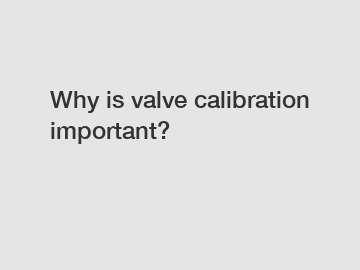Why is valve calibration important?
Valve calibration may not be a topic that immediately captures your attention, but its importance cannot be overstated. Whether you are familiar with valves or not, understanding their calibration is crucial for optimal performance and overall safety. In this blog post, we will delve into the reasons why valve calibration is important and how it affects various industries.
First and foremost, valve calibration plays a critical role in ensuring the accuracy and reliability of flow control. Valves are used in a wide range of applications, from controlling the flow of fluids in pipelines to regulating pressure in industrial processes. The correct calibration of valves ensures that the flow rates and pressure levels are precisely controlled, preventing any deviations that could lead to inefficiencies, equipment damage, or even hazardous conditions.
Imagine a scenario where valves controlling the flow of gas in a chemical plant are inadequately calibrated. The consequences could be dire, jeopardizing the safety of workers and the environment. A minor oversight in valve calibration could result in excessive pressure build-up, potentially leading to catastrophic equipment failures or leaks. To prevent such calamities, precise valve calibration is indispensable.

Furthermore, valve calibration is crucial in industries where precise and consistent flow rates are required. Consider the pharmaceutical industry, where the calibration of valves used in drug manufacturing processes is of utmost importance. Even the slightest variation in the quantities of active ingredients could render the final product ineffective or, worse, dangerous. By ensuring accurate valve calibration, pharmaceutical companies can have confidence in producing reliable and safe medications for patients.
In addition to safety and quality considerations, valve calibration also plays a pivotal role in optimizing energy consumption. By calibrating valves to match the specific flow requirements of a system, energy efficiency can be greatly improved. For instance, in HVAC (heating, ventilation, and air conditioning) systems, properly calibrated valves help maximize energy savings by delivering the exact amount of hot or cold air needed to maintain optimal indoor temperatures. This leads to reduced energy waste and lower utility bills, benefiting both the environment and the economy.
Valve calibration is not a one-time procedure; it requires periodic adjustments and maintenance. Over time, valves may experience wear and tear, resulting in a deviation from their original calibration settings. Regular calibration checks are essential to ensure that valves continue to perform optimally, even as conditions change. Ignoring or neglecting these maintenance routines may lead to decreased efficiency, increased energy consumption, and ultimately, costly repairs or replacements.
Some industries are subject to strict regulatory guidelines, demanding adherence to specific standards for valve calibration. For instance, the oil and gas industry must comply with regulations that mandate accurate measurement and control of oil and gas flow rates. Failure to meet these standards can result in legal consequences, jeopardizing the reputation and financial stability of companies in the sector. By prioritizing valve calibration, businesses can remain compliant with industry regulations and avoid any legal troubles.
In conclusion, valve calibration is crucial across various industries, impacting safety, quality, energy efficiency, and compliance. Proper calibration ensures accurate flow control, preventing potential hazards and maintaining product integrity. It contributes to energy conservation, reducing costs and environmental impact. Ultimately, valve calibration should be viewed as an investment in the long-term performance, reliability, and sustainability of any operation that utilizes flow control mechanisms. By understanding its importance and prioritizing routine calibration, businesses can ensure optimal performance, minimize risks, and uphold their commitment to safety and regulation compliance.
For more information, please visit China Pipeline Pre Commissioning, China Pipeline Process Services Provider, China Sub-sea Pipeline Testing Offshore Pipeline Inspection.
159
0
0


Comments
All Comments (0)